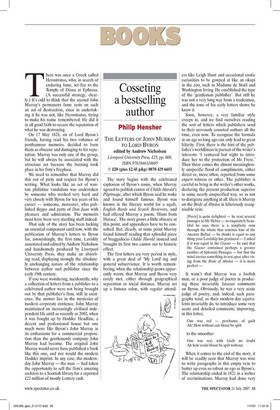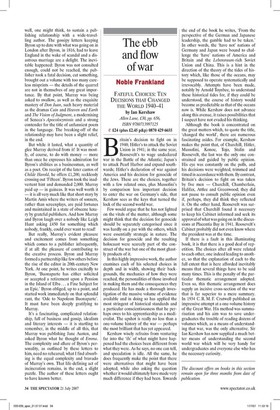Cosseting a bestselling author
Philip Hensher THE LETTERS OF JOHN MURRAY TO LORD BYRON edited by Andrew Nicholson Liveipool University Press, £25, pp. 608, ISBN 9781846310695 © £20 (plus £2.45 p&p) 0870 429 6655 There was once a Greek called Herostratus, who, in search of enduring fame, set fire to the Temple of Diana at Ephesus. (A successful strategy, clearly.) It's odd to think that the second John Murray's permanent fame rests on such an act of destruction, since in undertaking it he was not, like Herostratus, trying to make his name remembered. He did it in all good faith to secure the reputation of what he was destroying.
On 17 May 1824, six of Lord Byron's friends, having read his two volumes of posthumous memoirs, decided to burn them as obscene and damaging to his reputation. Murray was only one of the group, but he will always be associated with the atrocious act because the burning took place in his firm's fireplace.
We need to remember that Murray did this out of piety and respect for Byron's writing. What looks like an act of wanton philistine vandalism was undertaken by someone who worked very hard and very closely with Byron for ten years of his career — someone, moreover, who published Beppo and parts of Don Juan with pleasure and admiration. The memoirs must have been very startling stuff indeed.
That side of the story has been lacking an essential component until now, with the publication of Murray's letters to Byron for, astonishingly, the first time. Lavishly annotated and edited by Andrew Nicholson and handsomely produced by Liverpool University Press, they make an absorbing read, displaying strongly the absolutely unchanging nature of the relationship between author and publisher since the early 19th century.
If you were wondering, incidentally, why a collection of letters from a publisher to a celebrated author were not being brought out by that publisher's firm, still in existence, the answer lies in the mysteries of modern corporate existence. John Murray maintained an increasingly civilised independent life until as recently as 2002, when it was bought up by Hodder Headline, a decent and professional house but one much more like Byron's John Murray in its enthusiasm for a commercial proposition than the gentlemanly company John Murray had become. The original John Murray would never have published a book like this one, and nor would the modern Hodder imprint. In any case, the modernday John Murray — the man — had taken the opportunity to sell the firm's amazing archives to a Scottish library for a reported £22 million of mostly Lottery cash.
The story begins with the celebrated explosion of Byron's name, when Murray agreed to publish cantos of Childe Harold's Pilgrimage, after which Byron said he woke and found himself famous. Byron was known in the literary world for a squib, English Bards and Scotch Reviewers, and had offered Murray a poem, 'Hints from Horace'. The story grows a little obscure at this point, and appendices have to be consulted. But, clearly, at some point Murray found himself reading that splendid piece of braggadocio Childe Harold instead and brought its first two cantos out to historic effect.
The first letters are very period in style, with a great deal of 'My Lord'-ing and general subservience. It is worth remembering, when the relationship grows apparently warm, that Murray and Byron very rarely met, either through geographical separation or social distance. Murray set up a famous salon, with regular attenders like Leigh Hunt and occasional exotic curiosities to be gawped at like an okapi in the zoo, such as Madame de Stael and Washington Irving. He established the type of the 'gentleman publisher'. But still he was not a very long way from a tradesman, and the tone of his early letters shows he knew it.
Soon, however, a very familiar style creeps in, and we find ourselves reading the sort of letters which publishers send to their nervously cosseted authors all the time, even now. To recognise the formula in an age so long ago can only lead to great hilarity. First, there is the hint of the publisher's worldliness in pursuit of the writer's interests: 'I ventured last night to introduce her to the protection of Mr Frere.' Then there comes the almost meaninglessly unspecific flood of compliments, either direct or, more often, reported from some expert witness or other. The publisher is careful to bring in the writer's other works, declaring the present production superior in some nearly unspecified way, so as not to denigrate anything at all. Here is Murray on the Bride of Abydos in hilariously recognisable vein: [Frere] is quite delighted — he read several passages to Mr Heber — as exquisitely beautiful he says there is a simplicity runs through the whole that reminds him of the Ancient Ballad — he thinks it equal to any thing your Lordship has produced — I asked if it was equal to the Giaour — he said that the Giaour contained perhaps a greater number of Splendid Passages — but that the mind carries something to rest upon after rising from the Bride of Abydos — it is more perfect — It wasn't that Murray was a foolish man, or a poor judge of poetry in producing these invariably fatuous comments on Byron. Obviously, he was a very acute judge of poetry, and, indeed, such paragraphs tend, as their modern-day equivalents invariably do, to introduce some very acute and detailed comments, improving, in this letter, One was red — perchance of guilt Ah! How without can blood be spilt to the smoother One was red, with Guilt no doubt Ah how could blood be spilt without.
When it comes to the end of the story, it will be readily seen that Murray was wise to write paragraphs in this empty vein to butter up even so robust an ego as Byron's. The relationship ended in 1821 in a welter of recriminations. Murray had done very well, one might think, to sustain a publishing relationship with a wide-travelling author. The gossipy letters keeping Byron up to date with what was going on in London after Byron, in 1816, had to leave England in the wake of scandal and a disastrous marriage are a delight. The inevitable happened: Byron was not consulted enough, could not be reached, the publisher took a fatal decision, cut something, brought out a volume with too many careless misprints — the details of the quarrel are not in themselves of any great importance. By that point, Murray was being asked to swallow, as well as the exquisite mastery of Don Juan, such heavy material as the dramas Cain and Heaven and Earth and The Vision of Judgment, a modernising of Seneca's Apocolocyntosis and a strong contender for the title of unfunniest poem in the language. The breaking-off of the relationship may have been a slight relief, in the end.
But while it lasted, what a quantity of glee Murray derived from it! It was mostly, of course, to do with money — more than once he expresses his admiration for Byron's abilities as a businessman, as well as a poet. On receipt of the later cantos of Childe Harold, he offers £1,200, recklessly crossing out 'Fifteen'. Byron took the inadvertent hint and demanded 2,000. Murray paid up — in guineas. It was well worth it — it is all very much like that short story by Martin Amis where the writers of sonnets, rather than screenplays, are paid fortunes and maintained in a state of obscene luxury by grateful publishers. And how Murray and Byron laugh over a nobody like Leigh Hunt asking £450 for something which nobody, frankly, could ever want to read!
But really, Murray's evident pleasure and excitement comes from something which comes to a publisher infrequently, if at all: the pleasure of contributing to the creative process. Byron and Murray formed a partnership like few others before the rise of the editor in 20th-century New York. At one point, he writes excitedly to Byron, 'Buonaparte has either solicited or accepted a retirement upon a Pension in the Island of Elba ... a Fine Subject for an Epic.' Byron obliged, up to a point, and started work immediately on that splendid rant, the 'Ode to Napoleon Buonaparte'. It must have been deeply gratifying to Murray.
It's a fascinating, complicated relationship, full of business and gossip, idealism and literary interests — it is startling to remember, in the middle of all this, that Murray was publishing Jane Austen, and asked Byron what he thought of Emma. The complexity and allure of Byron's personality, as outlined by these letters to him, need no rehearsal; what I find absorbing is the equal complexity and bravado of Murray's own. That life-defining act of incineration remains, in the end, a slight puzzle. The author of these letters ought to have known better.













































 Previous page
Previous page